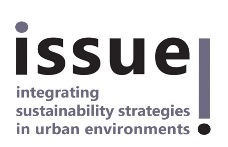ISSUE – Integrating Sustainability Strategies in Urban Environments
Develop innovative strategies to support sustainable development in urban and peri-urban areas.

Project leader: Berit Balfors
Project participants from KTH: Johan Högström, Ivo Martinac, Ulla Mörtberg, Peter Brokking, Sara Borgström, Sara Khoshkar and Kedar Uttam.
Partners: Stockholm Resilience Center, Stockholm University; Sweco Environment AB; Skanska; Riksbyggen; Nacka municipality; Täby municipality; City of Stockholm; Knivsta municipality; Upplands-Väsby municipality
Funder: FORMAS and Bolin Centre RA7
Project period: 2015-2020
Project description
The overall aim of the project is to develop innovative strategies to support sustainable development in urban and peri-urban areas, advance knowledge regarding sustainability through multi-stakeholder collaboration and analyse future developments. An innovative research design is applied to facilitate an open dialogue between key stakeholders on novel solutions for sustainable development in the context of ongoing developments and local and regional challenges. These developments and challenges are represented in Test Beds. A Think Tank is connected to each Test Bed with representatives from KTH, Skanska, SWECO, Riksbyggen; Knivsta, Nacka, Täby and Upplands-Väsby municipalities and the City of Stockholm. The Think Tanks are formed around current challenges on:
- strategies and processes for sustainable urban development,
- social sustainability,
- ecosystem services and blue-green solutions,
- energy solutions from a systems perspective, and
- digital tools for analysis and planning.
The Think Tanks meet in the Project Assembly and will together; analyse strengths, challenges and shortcomings in existing planning practice that affect sustainable urban development; identify and evaluate indicators, methods and tools that provide an analytical support in the search for innovative solutions for sustainable development; and develop innovative solutions for materializing sustainable urban development based on stakeholder collaboration and comprehensive solutions.
Information: Berit Balfors, balfors(at)kth.se
Publications
| 2019 |
Högström, J, Balfors, B. and Hammer, M. 2019. The role of small-scale planning projects in urban development: A case study in the metropolitan Stockholm region, Sweden . Land Use Policy 84: 294-304. |
| 2018 | Khoshkar, S., Balfors, B. and Wärnbäck, A. 2018. Planning for green qualities in the densification of suburban Stockholm – opportunities and challenges . Journal of Environmental Planning and Management 61: 2613-2635. |
| 2017 | Högström, J, Balfors, B and Hammer, M. 2017. Planning for sustainability in expansive metropolitan regions: exploring practices and planners’ expectations in Stockholm, Sweden . European Planning Studies 26: 439-457. |
| 2017 |
Högström, J., 2017. Towards sustainable urban development in expansive urban regions: Conditions and challenges for municipal spatial planning practice , TRITA-SEED-LIC 2017:01. KTH Royal Institute of Technology, Stockholm, 15 pp. |
| 2017 |
Lundgren, K., 2017. Planning support for reducing risks related to flooding : A case study of flood response in Kista residential area and Igelbäcken stream, Sweden , TRITA-LWR Degree Project 2017:13. Department of Sustainable Development, Environmental Science and Engineering, KTH Royal Institute of Technology, Stockholm. |
| 2017 |
Lundgren, K., Kalantari, Z., Mörtberg, U., Samuelsson, H., 2017. Planning support for reducing risks related to flooding in the Stockholm Region . Poster presented at the European Geosciences Union General Assembly, 23-28 April 2017 in Vienna, Austria. |
| 2017 |
Stenfors, E. and Alesund, M., 2017. Digital tools and data in the Detailed Planning process in Stockholm municipality - A conclusive needs assessment and SWOT analysis , TRITA-LWR Degree Project 2017:07. Department of Sustainable Development, Environmental Science and Engineering, KTH Royal Institute of Technology, Stockholm. |
